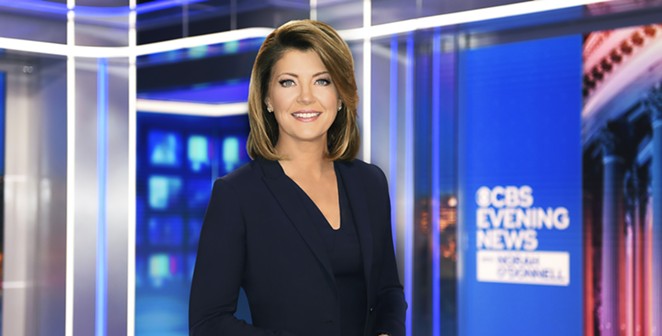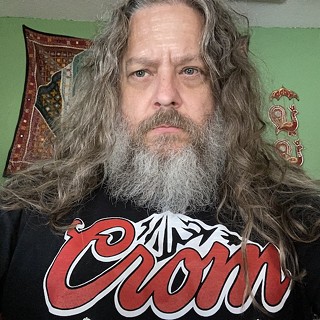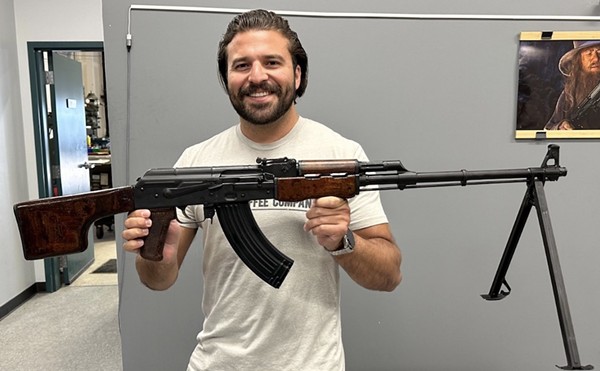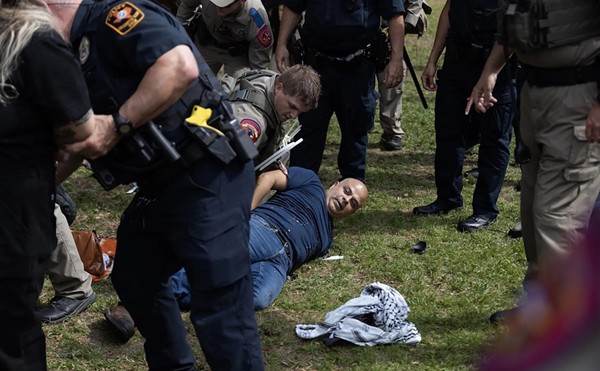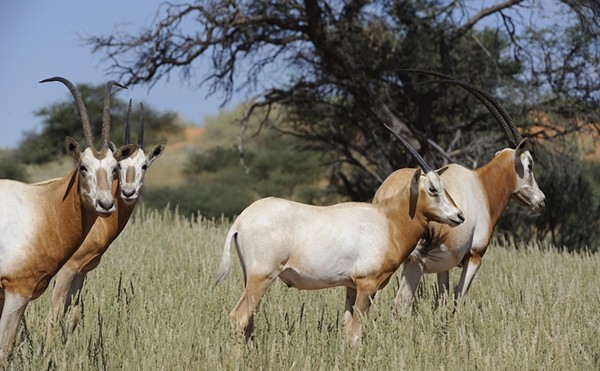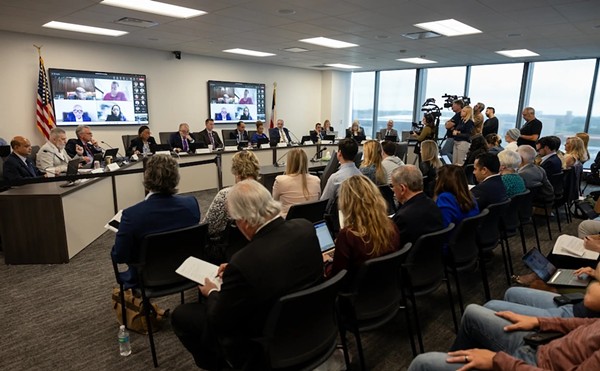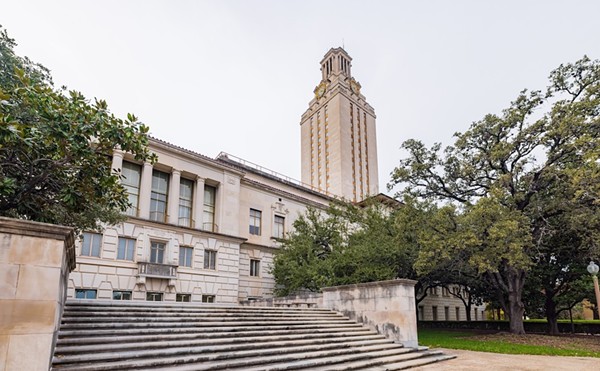San Antonio-raised CBS anchor Norah O'Donnell says November election will challenge media
By Sanford Nowlin on Fri, Oct 9, 2020 at 4:52 pm
Born into a military family, CBS Evening News anchor Norah O'Donnell grew up in San Antonio and attended Douglas MacArthur High School.
In her current position, O’Donnell, 46, has covered the 2020 Democratic and Republican National Conventions and interviewed newsmakers including Dr. Anthony Fauci, Democratic presidential nominee Joe Biden and Microsoft founder Bill Gates, among others.
After a career that started in print journalism, she jumped to television news in 1999. Since joining CBS in 2011, she's held down positions ranging from chief White House correspondent to CBS This Morning co-anchor. She also serves as a correspondent on long-running news magazine show 60 Minutes.
As the U.S. hurtles into an unprecedented election season, we caught up O'Donnell to get a veteran journalist's perspective on the challenges of covering what may be the most consequential — and chaotic — presidential election of our lifetimes.
This may not be an election where it's clear who won the night the polls close. What's the media's responsibility in making sure they get this right and not call the contest before it's decided?
Look, the 2020 election is the Super Bowl of all elections. I've covered six presidential races, including the 2000 presidential race, which was not decided on election night and which went all the way to the Supreme Court. So, it's not my first rodeo on what could be a disputed election.
The last presidential election was decided by 70,000 votes in three states, and that's why Hillary Clinton lost. While Hillary Clinton won the popular vote by 3 million, she lost the electoral college because of 70,000 votes in three states. So, we've seen very close contests in the past, and CBS News is going to be prepared for that. We spent a lot of time talking about how to do this. To give our viewers the best information and to provide as much transparency as possible all throughout election night.
And so, here's what we're thinking right now: I mean, unless it is a blowout, we will likely not know the winner on election night. At CBS News, we believe it's important to convey that early and often. It does not mean that the election is rigged or that there is fraud. We're in the middle of a once-in-a-century pandemic, so we also expect an unprecedented number of people who will vote by mail — around 80 million.
There are governors, in both red and blue states, that have made COVID the reason that anyone can request an absentee ballot. That's different than in Texas, our home state. But in many of these states across the country, and in most of the battleground states, governors — because of the pandemic — have made it easier to vote by mail or request an absentee ballot.
We also know that each of the states are different about when they can begin counting those ballots. For instance, Florida has a long history of many people voting by mail or absentee. They've done it in the past. They check the ballots early. They can count them earlier than other states, and so we're not as concerned with a state like Florida.
In a state like Pennsylvania, there are strict ballot requirements that are new and that are being litigated at this hour. That’s one of the things that we're looking at. So, if this election were to come down to the state of Pennsylvania, it may take a week or two, because of the specific ballot rules that they have in Pennsylvania for when they can start opening pre-certified ballots, and then counting these ballots. They can only start doing that on election day, and they're expecting a huge number of mail and absentee ballots in Pennsylvania.
What keeps you up at night in terms in terms of what the media could get wrong during this cycle?
According to our director of elections and surveys at CBS, we have a lot of different data at our fingertips. Not only do we have state-by-state polling, we also have exit poll data. We also have data provided by the Secretary of State's Office, about who from which party has requested absentee ballots. There are a lot of pieces of data that are coming in that can give us a clearer picture of which way the vote is going on election night, but we have to wait for the final tally, and we're going to convey that to our viewers all throughout the night.
To be honest, what keeps me up at night is not that the democratic process will be rigged or that there's fraud. What keeps me up at night is foreign interference. It's not my own personal view. It is based on my reporting, and I think it's the one thing that has not received a great deal of media attention, just because there's so much going on. But, for the past year, I've been speaking with top intelligence and law enforcement officials, who continue to be concerned about foreign interference. We saw it in the 2016 election. The efforts to sow division and chaos, and this year they're at it again.
The top actors are Russia, China and Iran. The officials that I've spoken with are most concerned that on election day there could be a cyberware or ransomware attack. So, that in the process of, let's say, the Secretary of State of Texas conveying the results to the Associated Press or to other media organizations — because that information is conveyed over the internet — that there could be a cyberattack.
The Russians were actually successful doing this in Ukraine in 2016. They've done it before and actually changed the vote tally. That's the thing that keeps me up at night, because that's the stuff that you just don't know is actually happening. Our intelligence and law enforcement officials say they have good countermeasures, but it's that outside interference that worries me, that I think could sow chaos and confusion.
Not just speaking about the election here, President Trump has disregarded numerous democratic norms during his time in office. Have folks have covering Washington been indelibly changed by the way they’ve had to cover this president?
No doubt. I started covering the White House under President Bill Clinton around 1999 … as a broadcast journalist. I was a print journalist before that. Covering the White House has always been considered the top job in journalism, right? Because it's a front-row seat to history. It's covering the most powerful position in the world, and every issue intersects with the White House, right? Whether it's war, terrorism, climate change, unrest, health.
Everything intersects with the White House. And so, that job is being prepared for anything at a moment's notice, because that's what the president has to do. And so, reporters that cover the White House are prepared for anything. But the Trump presidency has been unlike any other, because it really is only organized by one person. And that's the president.
He really decides and runs everything. There is no council or committee. I mean, he just dictates, and he runs at a pace that is just all-consuming. He's all-consuming. I do believe that he is the first president in the era of powerful social media and cable news. Obama dominated digital and social. He used it masterfully in order to be elected in 2008 and 2016, but not in the way Trump has.
Trump has exploded his power on social media. When I covered George W. Bush, he would always say, "I don't like talking to you, media, because you guys are the filter. I don't want to have to talk through the filter. You guys are the filter." Well, with Trump, there is no filter, because he can use Twitter to speak directly to the American people. That, in some ways, is the clearest way in which I can explain what's changed between, essentially, the last Republican president and this Republican president.
You grew up in San Antonio. Can you point to anything during your time here that pushed you toward the career you're in now?
That's such a great question. I mean, I ended up in San Antonio because my dad was stationed at Fort Sam Houston. My dad was drafted during the Vietnam War and then stayed in the Army for 20 years. I spent most of my childhood growing up in San Antonio, Texas. We did a short tour of duty to Seoul, South Korea when I was in middle school.
My parents revered the news. We revered journalism. We watched the news every night. I watched 20/20 and 60 Minutes and Saturday Night Live. And read the newspapers. My parents would not throw away the newspaper until they had underlined it and read the entire thing back to front. And so, there was always a reverence, not only for journalism and the public service role that journalism plays, but also just for facts and science. I think that's what ultimately led me into journalism.
Are you concerned that, because of Trump's rhetoric over the past four years, we've seen a diminishment of folks understanding the importance of journalism and its watchdog function?
Yes. I'm sitting in the chair now that Walter Cronkite held for more than two decades, and he was known as the most trusted man in America. As I was preparing to take over this role, anchoring the CBS Evening News, I went back and read his autobiography. Spent a lot of time talking to people about Walter Cronkite. One of the quotes that he said was: "Journalism is what we need to make democracy work." And I thought, "Oh, wow." That's says it all, right?
You need an informed electorate to make democracy work. Not only so that we vote for the right type of person, but also so that we hold those people accountable. That's what journalism does. I mean, think about the greatest moments in journalistic history, and I'm only talking about modern history. Watergate. Investigations into the Clintons and things they were doing. The journalistic work that exposed abuse in the Catholic Church and demanded accountability, and that fundamentally changed the church. The #MeToo movement. I mean, all of these are examples of — probably the most high-profile — but there are many more examples of incredible journalistic work that has created change. ... It saddens me that there has been an attack on journalism.
This interview was edited for clarity and length.
Stay on top of San Antonio news and views. Sign up for our Weekly Headlines Newsletter.
In her current position, O’Donnell, 46, has covered the 2020 Democratic and Republican National Conventions and interviewed newsmakers including Dr. Anthony Fauci, Democratic presidential nominee Joe Biden and Microsoft founder Bill Gates, among others.
After a career that started in print journalism, she jumped to television news in 1999. Since joining CBS in 2011, she's held down positions ranging from chief White House correspondent to CBS This Morning co-anchor. She also serves as a correspondent on long-running news magazine show 60 Minutes.
As the U.S. hurtles into an unprecedented election season, we caught up O'Donnell to get a veteran journalist's perspective on the challenges of covering what may be the most consequential — and chaotic — presidential election of our lifetimes.
This may not be an election where it's clear who won the night the polls close. What's the media's responsibility in making sure they get this right and not call the contest before it's decided?
Look, the 2020 election is the Super Bowl of all elections. I've covered six presidential races, including the 2000 presidential race, which was not decided on election night and which went all the way to the Supreme Court. So, it's not my first rodeo on what could be a disputed election.
The last presidential election was decided by 70,000 votes in three states, and that's why Hillary Clinton lost. While Hillary Clinton won the popular vote by 3 million, she lost the electoral college because of 70,000 votes in three states. So, we've seen very close contests in the past, and CBS News is going to be prepared for that. We spent a lot of time talking about how to do this. To give our viewers the best information and to provide as much transparency as possible all throughout election night.
And so, here's what we're thinking right now: I mean, unless it is a blowout, we will likely not know the winner on election night. At CBS News, we believe it's important to convey that early and often. It does not mean that the election is rigged or that there is fraud. We're in the middle of a once-in-a-century pandemic, so we also expect an unprecedented number of people who will vote by mail — around 80 million.
There are governors, in both red and blue states, that have made COVID the reason that anyone can request an absentee ballot. That's different than in Texas, our home state. But in many of these states across the country, and in most of the battleground states, governors — because of the pandemic — have made it easier to vote by mail or request an absentee ballot.
We also know that each of the states are different about when they can begin counting those ballots. For instance, Florida has a long history of many people voting by mail or absentee. They've done it in the past. They check the ballots early. They can count them earlier than other states, and so we're not as concerned with a state like Florida.
In a state like Pennsylvania, there are strict ballot requirements that are new and that are being litigated at this hour. That’s one of the things that we're looking at. So, if this election were to come down to the state of Pennsylvania, it may take a week or two, because of the specific ballot rules that they have in Pennsylvania for when they can start opening pre-certified ballots, and then counting these ballots. They can only start doing that on election day, and they're expecting a huge number of mail and absentee ballots in Pennsylvania.
What keeps you up at night in terms in terms of what the media could get wrong during this cycle?
According to our director of elections and surveys at CBS, we have a lot of different data at our fingertips. Not only do we have state-by-state polling, we also have exit poll data. We also have data provided by the Secretary of State's Office, about who from which party has requested absentee ballots. There are a lot of pieces of data that are coming in that can give us a clearer picture of which way the vote is going on election night, but we have to wait for the final tally, and we're going to convey that to our viewers all throughout the night.
To be honest, what keeps me up at night is not that the democratic process will be rigged or that there's fraud. What keeps me up at night is foreign interference. It's not my own personal view. It is based on my reporting, and I think it's the one thing that has not received a great deal of media attention, just because there's so much going on. But, for the past year, I've been speaking with top intelligence and law enforcement officials, who continue to be concerned about foreign interference. We saw it in the 2016 election. The efforts to sow division and chaos, and this year they're at it again.
The top actors are Russia, China and Iran. The officials that I've spoken with are most concerned that on election day there could be a cyberware or ransomware attack. So, that in the process of, let's say, the Secretary of State of Texas conveying the results to the Associated Press or to other media organizations — because that information is conveyed over the internet — that there could be a cyberattack.
The Russians were actually successful doing this in Ukraine in 2016. They've done it before and actually changed the vote tally. That's the thing that keeps me up at night, because that's the stuff that you just don't know is actually happening. Our intelligence and law enforcement officials say they have good countermeasures, but it's that outside interference that worries me, that I think could sow chaos and confusion.
Not just speaking about the election here, President Trump has disregarded numerous democratic norms during his time in office. Have folks have covering Washington been indelibly changed by the way they’ve had to cover this president?
No doubt. I started covering the White House under President Bill Clinton around 1999 … as a broadcast journalist. I was a print journalist before that. Covering the White House has always been considered the top job in journalism, right? Because it's a front-row seat to history. It's covering the most powerful position in the world, and every issue intersects with the White House, right? Whether it's war, terrorism, climate change, unrest, health.
Everything intersects with the White House. And so, that job is being prepared for anything at a moment's notice, because that's what the president has to do. And so, reporters that cover the White House are prepared for anything. But the Trump presidency has been unlike any other, because it really is only organized by one person. And that's the president.
He really decides and runs everything. There is no council or committee. I mean, he just dictates, and he runs at a pace that is just all-consuming. He's all-consuming. I do believe that he is the first president in the era of powerful social media and cable news. Obama dominated digital and social. He used it masterfully in order to be elected in 2008 and 2016, but not in the way Trump has.
Trump has exploded his power on social media. When I covered George W. Bush, he would always say, "I don't like talking to you, media, because you guys are the filter. I don't want to have to talk through the filter. You guys are the filter." Well, with Trump, there is no filter, because he can use Twitter to speak directly to the American people. That, in some ways, is the clearest way in which I can explain what's changed between, essentially, the last Republican president and this Republican president.
You grew up in San Antonio. Can you point to anything during your time here that pushed you toward the career you're in now?
That's such a great question. I mean, I ended up in San Antonio because my dad was stationed at Fort Sam Houston. My dad was drafted during the Vietnam War and then stayed in the Army for 20 years. I spent most of my childhood growing up in San Antonio, Texas. We did a short tour of duty to Seoul, South Korea when I was in middle school.
My parents revered the news. We revered journalism. We watched the news every night. I watched 20/20 and 60 Minutes and Saturday Night Live. And read the newspapers. My parents would not throw away the newspaper until they had underlined it and read the entire thing back to front. And so, there was always a reverence, not only for journalism and the public service role that journalism plays, but also just for facts and science. I think that's what ultimately led me into journalism.
Are you concerned that, because of Trump's rhetoric over the past four years, we've seen a diminishment of folks understanding the importance of journalism and its watchdog function?
Yes. I'm sitting in the chair now that Walter Cronkite held for more than two decades, and he was known as the most trusted man in America. As I was preparing to take over this role, anchoring the CBS Evening News, I went back and read his autobiography. Spent a lot of time talking to people about Walter Cronkite. One of the quotes that he said was: "Journalism is what we need to make democracy work." And I thought, "Oh, wow." That's says it all, right?
You need an informed electorate to make democracy work. Not only so that we vote for the right type of person, but also so that we hold those people accountable. That's what journalism does. I mean, think about the greatest moments in journalistic history, and I'm only talking about modern history. Watergate. Investigations into the Clintons and things they were doing. The journalistic work that exposed abuse in the Catholic Church and demanded accountability, and that fundamentally changed the church. The #MeToo movement. I mean, all of these are examples of — probably the most high-profile — but there are many more examples of incredible journalistic work that has created change. ... It saddens me that there has been an attack on journalism.
This interview was edited for clarity and length.
Stay on top of San Antonio news and views. Sign up for our Weekly Headlines Newsletter.
Tags:

KEEP SA CURRENT!
Since 1986, the SA Current has served as the free, independent voice of San Antonio, and we want to keep it that way.
Becoming an SA Current Supporter for as little as $5 a month allows us to continue offering readers access to our coverage of local news, food, nightlife, events, and culture with no paywalls.
Scroll to read more San Antonio News articles
About The Author
Newsletters
Join SA Current Newsletters
Subscribe now to get the latest news delivered right to your inbox.

